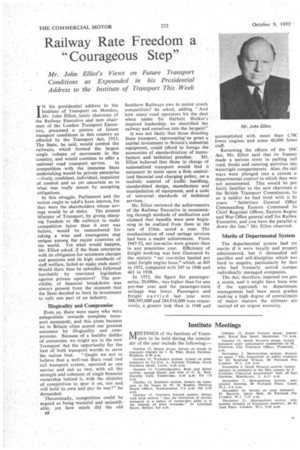Railway Rate Freedom a "Courageous Step"
Page 42

If you've noticed an error in this article please click here to report it so we can fix it.
Mr. John Elliot's Views on Future Transport Conditions as Expounded in his Presidential Address to the Institute of Transport This Week
IN his presidential address to the Institute of Transport on Monday, Mr. John Elliot, lately chairman of the Railway Executive and now chairman of the London Transport Executive, presented a picture of future transport conditions in this country as affected by the Transport Act, 1953, The State, he said, would control the railways, which formed the largest single volume of movement in the 'country, and would continue to offer a
national road transport. service. In competition with the immense State undertak,ing would be private enterprise —lively, confident, individual, impatient of control and as yet uncertain as to what was really meant by accepting obligations.
In this struggle, Parliament and the nation ought to takea keen interest, for they were the shareholders whose savings would be at stake. The present Minister of Transport, by giving charging freedom to tile railways to make competition fairer than it ever was before, would be remembered for taking a wise and courageous step unique among the major countries of the world. Yet what would happen, Mr. Elliot asked, if the State enterprise with its obligation for minimum charges and pensions and its high standards of staff welfare, failed-to make ends meet? Would there then be subsidies followed inevitably by restricted legislation against private operators? The possibility . of financial breakdown was always present from the moment. that the State decided to limit its investment to only one part of an industry.
Illogicality and Compromise
Even so, there were many who were antagonistic towards complete transport monopoly, and this arose because we in Britain often scored our greatest successes by illogicality and compromise. Because of a healthy dislike of extremists, we might see in the new Transport Act the opportunity for the best of 'both transport worlds to serve the nation heSt. "Ought we not to believe that a well-run State road and rail transport system, operated as one service and not as two, with all the strength and cohesion of single financial ownership behind it, with the stimulus of competition to spur it on, can and, , will hold its own and pay its way?" he demanded.
Theoretically, competition could be argued as being wasteful and unjustifiable, yet how much did the old B8 Southern Railways owe to motor coach competition? he asked, adding "And how many-road operators bit the dust when under Sir Herbert Walker's inspired leadership, we electrified the railway and ourselves into the bargain!"
It was not likely that those directing State transport, representing's° great a capital investment in Britain's industrial equipment, could afford to forego the economies of standardization of manu facture and technical practice. Mr. Elliot believed that those in charge of nationalized transport would find it necessary to insist upon a firm centralized financial and charging policy, on a realistic control of traffic handling, standardized design, manufacture and manipulation of equipment, and a code of universal. standards of technical services.
Mr. Elliot reviewed the achievements of the Railway Executive in economizing through methods of unification and claimed that benefits were now beginning to be realized from them at the rate of £16m, saved a year. The mechanization of road cartage services had been a major achievement. From 1947-52, net ton-miles were greater than in any peacetime year. Efficiency of freight working was best illustrated by the statistic " net ton-miles hauled per total freight engine hour," which, at 605 in 1952, compared with 547 in 1948 and 461 in 1938.
In 1952, the figure for passengermiles, 20,690m., was higher than for any pre-war year and the passenger-train mileage was lower. Passengers and freight carried last year were 988,997,00ff and 284,916,000 tons respectively, agreater task than in 1948 and accomplished with more than 1,'70C fewer engines and some 40,000 !ewe; staff.
Reviewing the effects of the 1941 Act, Mr. Elliot said that its framer! Made a serious error in putting rail road, docks and catering activities int( watertight compartments. Also, the rail ways were plunged into a system o departmental control to which they weri not accustomed. This would be per fectly familiar to the new chairman o the British Transport Commission, fo as a soldier he tad lived with it fo years. 'Substitute General Office Commanding Eastern Command fo Chief Regional Officer, Eastern Regior and War Office general staff for Railwa Executive, and you have the parallel al down the line." Mr. Elliot observed.
Merits of Departmental System
The departmental system had ree merits if it were loyally and propert administered, but it demanded sell sacrifice and self-discipline which wet hard to acquire, particularly by thos who had formerly served compai individually managed companies.
The Act, therefore, imposed too gres a strain, and it might have been wisc if the approach to departments management had been more gradua making a high degree of centralizatio of major matters the ultimate amn instead of an urgent necessity.




























































































